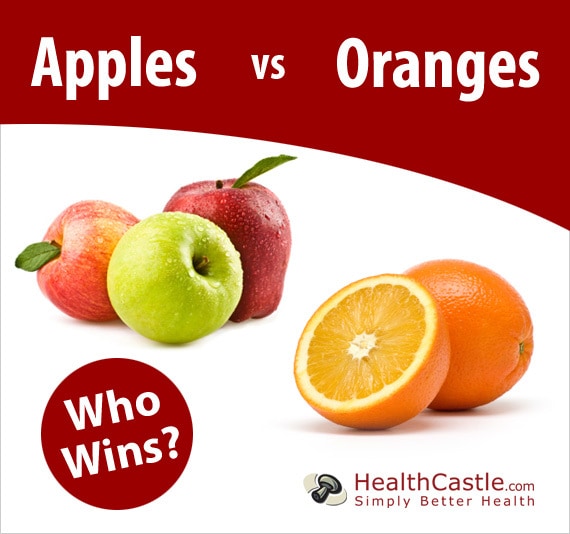
Written By: Gloria Tsang, RD
Title: Founding Registered Dietitian
Alumni: University of British Columbia
Last Updated on:

We’re all familiar with the phrase “don’t compare apples to oranges.” We thought it would be fun to take that familiar phrase to heart and actually compare these two different fruits. Is there a clear winner between the two?
Table of Contents
| Apple | Orange | |
| Serving Size | 1 small (165 g), skin on | 1 navel orange (140 g) |
| Calories | 101 kcal | 65.8 kcal |
| Carbohydrate | 24.4 g | 14.8 g |
| Fiber | 3.5 g | 2.8 g |
| Net Carb | 20.9 g | 12 g |
| Protein | 0.3 g | 1.3 g |
| Fat | 0.3 g | 0.2 g |
| Vitamin C | 7.6 mg | 82.7 mg |
| Potassium | 172 mg | 232 mg |
| Folate | 0 | 35 µg |
| Glycemic Index | 29 – 44 (low) | 31- 48 (low) |

Orange is a well-known source of Vitamin C, and the numbers confirm it.
Soluble fiber is often associated with beans and lentils; but fruits also provide this cholesterol-lowering nutrient. A medium orange provides ~ 1.8 g1 of soluble fiber, while an apple provides ~ 1 g2.
Some of us may wonder if apples and oranges are appropriate for people with diabetes. This thought may have been sparked from their juice counterpart. As a whole fruit despite tasting sweet, both apple and orange can be enjoyed by people living with diabetes. As you can see from the table above, both fruits offer low glycemic index values. Just watch the portion size (i.e. choosing a smaller fruit), and pair your fruit with a source of protein to help slow down carbohydrate digestion and absorption.
If we were looking strictly at the numbers in the table above, orange seems to be the winner. For fewer calories per fruit, oranges provide higher levels of Vitamin C, folate, potassium, and protein, as well as lower net carb content.
However, the benefit of fruits is more than just the identified nutrient levels above. What the table doesn’t show is what other antioxidants and phytonutrients are present in both apples and oranges. Apples, for instance, when eaten with their skin on, deliver polyphenols that have antioxidant benefits. These polyphenols are particularly good at preventing oxidation of fats in our cell membranes, which is a key factor in the development of atherosclerosis.
Furthermore, in this nutritional comparison, apples seem to have higher net carb content, making them appear not as ideal as oranges in a diabetic diet. However, a 2005 study3 found that women eating at least an apple a day was associated with a 28% reduced risk of developing Type 2 diabetes, compared to others eating no apples.
HealthCastle has strict sourcing guidelines. We reference peer-reviewed studies, scientific journals and associations. We only use quality, credible sources to ensure content accuracy and integrity.
Alumni: University of British Columbia – Gloria Tsang is the author of 6 books and the founder of HealthCastle.com, the largest online nutrition network run by registered dietitians. Her work has appeared in major national publications, and she is a regularly featured nutrition expert for media outlets across the country. The Huffington Post named her one of its Top 20 Nutrition Experts on Twitter. Gloria’s articles have appeared on various media such as Reuters, NBC & ABC affiliates, The Chicago Sun-Times, Reader’s Digest Canada, iVillage and USA Today.
apples, nutrition faceoff, nutrition facts, nutritional comparison, oranges
Great read, helped settle a bet about apples and oranges.